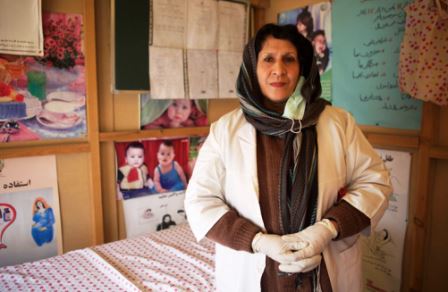
For 30 years, Dr Aziza has been providing health services to those most in need
August 2015 - For the past 4 years, Dr Aziza has been working as a midwife at a mobile clinic in Nasaji-Bagrami camp for internally displaced persons (IDPs) in Kabul. Operated by an Afghan nongovernmental organization Serve Health Relief and Development Organization (SHRDO), the clinic provides basic health services to 450 families living in the camp.
“I have seen a lot of positive change since I started working in this camp,” Dr Aziza says. “Before, people were not taking care of their personal hygiene and knew nothing about family planning or birth control. Now more and more women come to the clinic to seek these services.”
Despite progress in the last decade, maternal mortality rate remains high in Afghanistan with an average of 400 maternal deaths per 100 000 live births. Most of these deaths could be avoided by increasing women’s access to health services with skilled birth attendants.
Dr Aziza arrives at the camp at 8:30 am every morning and sees around 40 patients a day. She provides health education and also basic counselling services to women suffering from mental health issues. Many of her patients are pregnant women or women suffering from postnatal problems and high blood pressure.
Although the Nasaji-Bagrami IDP camp clinic does not have the facilities to provide childbirth services, Dr Aziza does what she can to help mothers and babies. She recommends women to go to hospitals and clinics for delivery and informs them about the risks associated with home births.
“One day when I came to the camp I saw one of my regular patients who had just given birth, telling me that the baby’s heart is not beating. I rushed to the mother and gave her baby mouth-to-mouth resuscitation and saved his life. I have also helped other women with their newborn babies,” Dr Aziza says.
Supported by the World Health Organization with USAID funding, the mobile clinic also provides life-saving vaccines to children. The mobile health team has been successful in changing the community’s perception about vaccination through outreach and health education. After receiving information about the benefits of vaccines, now almost all families come to the clinic regularly to immunize their children.
“I prefer to work in this clinic even if I have the chance to work in private hospitals,” Dr Aziza says. “Women are so deprived in our society. Through this work I can help them a lot which makes me very happy.”


